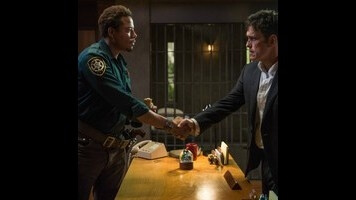Surreal thriller Wayward Pines features a huge twist: It’s actually a lot of fun

Fox’s limited-run, creepy-town thriller Wayward Pines doesn’t exist solely to troll its audience, but one could be forgiven for thinking otherwise after watching its opening scenes. The show begins with an extreme close-up of an eye belonging to Secret Service agent Ethan Burke (Matt Dillon), who snaps awake in an unfamiliar wooded area after suffering a trauma severe enough to leave his face gashed and bloody. He stumbles into the bucolic-to-a-fault Wayward Pines, Idaho, where it only takes a few disturbing interactions with the locals for Ethan to surmise he wound up there as a result of the kind of wrong turn that can’t be reconsidered. He tires of the town’s hostile hospitality and tries to hightail it out, only to discover that Wayward Pines is a town where you don’t outwear your welcome: Your welcome outwears you.
Pines, based on a well-regarded Blake Crouch novel, evokes a handful of influences, including The Prisoner and Twin Peaks, but its introductory sequence is most reminiscent of Lost, which also opens on the eyelid of a maverick-hero type who regains consciousness to find himself trapped in some sort of mystical netherworld. To make a conspicuous visual reference—literally a wink—to Lost is a ballsy move. Despite its many strengths, Lost’s legacy is informed less by its character building and emotional beats and more by its failure to exhaustively flesh out its mythology. Associating the two shows does Pines no favors with those who found Lost’s conclusion wanting. And as if to actively repel the once-bitten, the Pines pilot is directed by M. Night Shyamalan, whose personal brand has become synonymous with infuriating shaggy-dog stories.
 Keep scrolling for more great stories.
Keep scrolling for more great stories.
